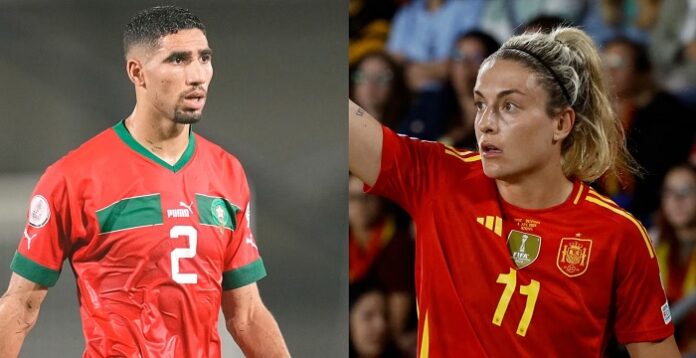Football at the Paris 2024 Olympics promises to be a spectacle of athletic prowess and surprising narratives.
Paris 2024 will feature some of the most prominent names in football. Achraf Hakimi, a key player for PSG and Morocco, is expected to be a standout performer. Alexia Putellas, the Spanish superstar, will also be competing, aiming to lead her team to glory.
The men’s football tournament kicks off on 24 July 2024, with the final scheduled for 10 August. According to the official Olympics website, the matches will be played across several venues in France, including the Stade de France in Paris.
OFFICIAL: Players that will be present in Iraq’s #Paris2024 Olympics group:
• Julián Álvarez (@ManCity) 🇦🇷
• Achraf Hakimi (@PSG) 🇲🇦
• Nicolás Otamendi (@SLBenfica) 🇦🇷
• Gerónimo Rulli (@AFCAjax) 🇦🇷 pic.twitter.com/zC0L72rMMD— Iraq Football Podcast (@IraqFootballPod) July 4, 2024
The women’s tournament follows a similar timeline, ensuring a packed schedule of high-stakes football action.
Anticipation is high for this year’s Olympic football tournament, expected to draw massive global attention.
For instance, at the Tokyo 2020 Olympics, the men’s final saw an average of 15.2 million viewers per game.
With the growing popularity of women’s football, similar, if not higher, numbers are expected for Paris 2024.
The evolving nature of Olympic football
The history of football at the Olympics is rich with unusual and remarkable stories.
In 1900, football was included in the Olympics for the first time in Paris. However, the event was considered more of an exhibition rather than an official competition.
By 1908, football had become an official Olympic sport, and the tournament held in London saw Great Britain win the gold medal.
One of the most bizarre incidents in Olympic football history occurred in 1928 during the Amsterdam Games. The Egyptian team refused to continue their match against Argentina after a controversial goal, leading to a walk-off.
In the same tournament, Uruguay demonstrated their football prowess by winning the gold medal, a feat they repeated in the inaugural FIFA World Cup in 1930.
It’s been 15 years since Leo Messi and Ángel Di María won their Olympic gold medals with Argentina.
Years later they cemented their legends with the World Cup 🤝🇦🇷 pic.twitter.com/HIOg8lklhB
— B/R Football (@brfootball) August 23, 2023
Looking ahead, the inclusion of football in the Olympics continues to evolve.
The inclusion of under-23 teams with a limited number of over-age players has given the Olympic football tournament a unique identity.
It has become a platform for young talents to showcase their skills on an international stage.
Players like Lionel Messi, Neymar, and Kylian Mbappé have all used the Olympics to highlight their potential before becoming global superstars.
Political and cultural impacts
The 1936 Berlin Olympics were marked by political overtones, as Adolf Hitler sought to use the Games as a propaganda tool.
However, the football tournament provided a moment of defiance when Norway defeated Germany in the quarter-finals, much to Hitler’s displeasure.
Post-World War II, the Olympic football tournament continued to evolve. The 1948 London Olympics saw the participation of a unified team from Great Britain, and they went on to win the gold medal.
My grandfather would have been 100 today. Here he is, fourth from the right, lining up as part of the Great Britain football team in the 1948 Olympics. Always enjoyed listening to his stories. pic.twitter.com/8AIfXa0b4M
— Jon Cockcroft (@Jon_Cockcroft) October 5, 2022
However, it was the 1952 Helsinki Games that truly highlighted the global nature of the sport. Hungary, led by the legendary Ferenc Puskás, dominated the tournament, showcasing a style of play that would influence football for decades to come.
The 1956 Melbourne Olympics were notable for the unexpected performance of the Indian team, which reached the semi-finals. Their barefoot play style fascinated audiences and left a lasting impression on the history of the sport.
In recent times, the Olympic football tournament has served as a springboard for future stars.
The 1996 Atlanta Olympics witnessed the emergence of Brazil’s Ronaldo and Argentina’s Hernán Crespo, both of whom went on to have illustrious careers.
Women’s football at the Olympics
The 2000 Sydney Olympics saw the introduction of the women’s football tournament, and the USA claimed the first gold medal, solidifying their status as a powerhouse in women’s football.
This event has continued to grow in significance, with the 2016 Rio Olympics showcasing the talents of players like Canada’s Christine Sinclair and Brazil’s Marta.
🇳🇴 Two Euros.
One World Cup.
Gold Medal of the 2000 Olympics Games.
The only european women’s national football team that also won this three competitions is Germany.
Others don’t know what is this. Norway ❤
📸 Photo 1 and 2: UEFA
Photo 3: NFF
Photo 4: Getty Images pic.twitter.com/wYvJGkT1C4— André Rodrigues (@alfssrnordicfan) July 17, 2021
The USA’s dominance in women’s football has been a recurring theme at the Olympics. They have won four out of the 6 gold medals awarded since 1996.
Stars like Mia Hamm, Abby Wambach, and Megan Rapinoe have become household names, inspiring millions of young girls to take up the sport.
The 2016 Rio Olympics marked a significant moment for women’s football, as it saw the rise of new contenders like Sweden, who reached the final against Germany.
The increased competition has led to a higher standard of play, with more countries investing in women’s football programs.
Economic and social impacts
Hosting the Olympic football tournament has significant economic and social impacts on the host cities.
The construction of new stadiums and the renovation of existing ones provide a boost to local infrastructure.
The influx of tourists and fans generates substantial revenue for the hospitality and service industries.
For instance, the 2012 London Olympics led to the revitalisation of several areas in the city, including the construction of the London Stadium, which later became the home of West Ham United.
The legacy of the Olympic football tournament extends beyond the immediate economic benefits, as it often inspires a new generation of football fans and players.
In Rio de Janeiro, the 2016 Olympics left a mixed legacy. While the football tournament was a highlight, with Brazil winning gold on home soil, the long-term benefits of the infrastructure investments remain a topic of debate.
Le Brésil préserve son titre de champion olympique, comme en 2016, en décrochant à nouveau la médaille d’or, pour la 2nde fois de son histoire, aux Jeux Olympiques de #Tokyo ! 🇧🇷🥇⚽️#brasil #brazil #seleção #jo #españa #spain #roja #gold #final pic.twitter.com/ztQLPqqEZz
— Royal Foot (@RylFoot) August 7, 2021
However, the emotional impact of Neymar’s decisive penalty in the final against Germany provided a moment of national pride and joy.
Looking ahead to Paris 2024, the women’s football tournament is expected to be one of the highlights of the Games.
With teams like the USA, Germany, and Japan consistently performing at a high level, the competition will be fierce. Additionally, emerging teams like Spain and the Netherlands are likely to make a significant impact.
The road to Paris 2024
As the countdown to Paris 2024 continues, teams from around the world are preparing to compete for Olympic glory. The qualification process is rigorous, with each continent hosting its own tournaments to determine which teams will participate.
In Europe, the UEFA Under-21 Championship serves as the qualification tournament for the Olympics. The top four teams from this competition will earn a spot in Paris 2024.
Similarly, the CAF Under-23 Cup of Nations determines Africa’s representatives, while the AFC Under-23 Championship serves the same purpose for Asia.
The #Paris2024 @Olympics Football Tournament groups are locked in! 👊 pic.twitter.com/wWeOjRAdQh
— FIFA World Cup (@FIFAWorldCup) March 20, 2024
The qualification tournaments are an opportunity for young players to gain valuable experience and showcase their talents on an international stage. For many, the road to the Olympics is a stepping stone to a professional career in football.
Football at the Paris 2024 Olympics is set to be an unforgettable event, filled with extraordinary talent, historic moments, and intense competition.




